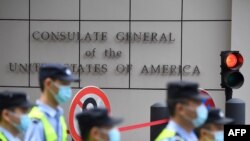The recent closure of the Chinese Consulate in Houston and the U.S. Consulate in Chengdu mark a new low point in ties between two of the world’s most powerful nations, analysts say.
There have been months of U.S-China tensions over Beijing’s role in the COVID-19 pandemic, its crackdown on political freedoms in Hong Kong, its alleged oppression of the Uighur Muslim minority, and the status of self-ruling Taiwan. Now, these policy disagreements are overshadowing areas of engagements such as on bilateral trade and North Korea's nuclear program.
Last week, U.S. Secretary of State Mike Pompeo said Beijing’s behavior on a wide range of issues requires a change in how the United States engages with China, saying Washington needs “more creative and assertive ways” to “induce China to change.”
Beijing defender Global Times editor Hu Xijin says China should take note of the increasing tensions and U.S.’s changing stance and take appropriate action.
“Take a look at the free fall of Sino-US relations. Don’t be naïve, and don’t expect that Washington’s China policy would change after the U.S. election,” he wrote on his social media account. “Hurry up and build more nuclear missiles to deter these American lunatics.”
But on social media, many Americans and Chinese see the situation as less dire, and hope that the countries can avoid a cold-war type standoff in the years ahead.
VOA Beijing correspondent Yibing Feng spoke with several who bridge the two countries to get a better sense of how Americans and Chinese are feeling about the current tensions.
Elliott Zaagman, Beijing-based American writer
As an American citizen based in Beijing, Elliott Zaagman writes about corporate culture in China, and is the host of podcast SupChina. He spoke to VOA Mandarin about his impression of Secretary of State Pompeo’s landmark China speech last week.
“I don’t agree with all of Pompeo’s China policy,” he said, “But the main takeaway of his speech is that the old way of engagement does not prove to be working. I think this is the essence of the speech, and this is going to be the fundamental principle for whoever’s in charge of the White House next year.”
“A year ago, I would travel around China and feel pretty at ease. Now it’s different,” Zaagman said.
He notes China has adopted a much more assertive and authoritarian playbook under Xi.
“They are making enemies everywhere, and it’s really bad,” Zaagman said.
He also pointed out that there’s some hope after the U.S. election.
“I think there’s possibility to restart peace negotiation if we have a new administration on the U.S. side. But I think there needs to be a change of foreign policy on the China side, maybe some structural changes in the CCP would be needed for the two sides to co-exist peacefully.”
Zaagman said he believes the Chinese Communist Party is a complex organization with some room for flexibility.
“I have more confidence in other CCP members than the current leadership,” he told VOA.
Liu Xiaohui San Francisco-based Chinese businessman
Liu Xiaohui is a former Chinese businessman from central Henan province. After he reported corruption by local officials and police agencies in his hometown, he later chose to immigrate to the U.S. for fear of retaliation.
He said the U.S. should be even tougher on China’s leader Xi Jinping and his government.
“I think the U.S. need to punish this government (China) that does not serve the people, I think we need tougher measures,” he told VOA.
Pointing out the fact that Pompeo has called to distinguish the CCP from the Chinese people, Liu said the U.S. should further distinguish the corrupted CCP members from ordinary CCP members who simply join the party to keep their jobs.
“Mr. Y” Beijing-based Chinese medical professional
Mr. Y, who asked to be identified by his nickname, owns a dental clinic in Beijing and his child is currently studying in the U.S.
“I hope the two countries can co-exist peacefully. The world can’t stop China’s rise, and China didn’t rise without the help from the world, especially the U.S.,” he told VOA. “I love my country, and I also appreciate how the U.S. had assisted China during World War II, and after China’s economic reform and opening up.”
Shen Dingli, Shanghai-based commentator on US-China relations
Shen Dingli told VOA that Pompeo’s speech on China shows U.S. disappointment on Beijing’s ability to fulfill its international obligations and key promises.
He said he understands why the U.S. secretary of state made such a speech, but the tone was overly confrontational.
“Beijing and Washington are partners, not enemies,” said Shen. “Trump and Pompeo treat China as America’s enemy; I think that’s unwise. But it’s also understandable, in the sense that the U.S. has come to the realization that it can’t just hope China will keep all its rosy promises.”
He added that the U.S. should keep a close eye on China’s behavior on the international stage.
“Pompeo said this himself, it’s not that the U.S. does not want to work with China, it’s that China must abide by international norms when it comes to mutual matters. Not U.S. rules, international rules.” Shen said.
He also dismissed recent bilateral moves to close each other’s consulates, saying such an approach is unconstructive and increases the possibility of war.




